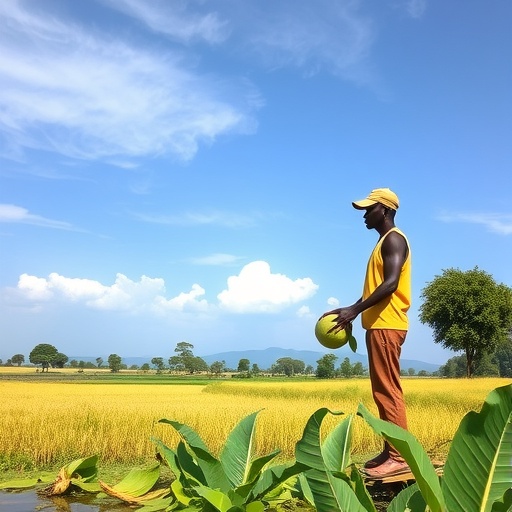In the semi-arid regions of Tanzania, climate change presents a formidable challenge for agricultural practices, affecting the livelihoods of thousands of farmers who depend on a precarious economic model. Recent research by Mramba and Mapunda highlights the urgency of understanding farmers’ awareness regarding the impacts of climate change and their adaptation strategies. Climate change is not merely an environmental issue; it is a comprehensive phenomenon that intertwines with socio-economic factors. The astounding rise in global temperatures and systematic weather alterations are reshaping agricultural landscapes, thus necessitating immediate attention and proactive measures.
The study conducts a comprehensive assessment of farmers’ perceptions about climate change, aiming to illuminate the frequency and severity of climactic changes as experienced by local agriculturalists. The methodology includes surveys and interviews that gauge farmers’ understandings and first-hand experiences with climate threats, as well as their adaptive responses. This grassroots-level inquiry underscores the necessity for localized data, as understanding farmers’ perceptions is vital for formulating effective adaptation and mitigation strategies.
Understanding how and what farmers perceive is crucial to developing tailored interventions that could potentially enhance resilience against climate adversities. The data gathered indicates that many farmers are aware of climate change but exhibit varying degrees of understanding concerning its implications. This discrepancy emphasizes the need for awareness programs designed to cultivate a more uniform comprehension of climate impacts. Such initiatives could significantly empower farmers, enabling them to adopt adaptive practices effectively.
Adaptation practices are critical in the fight against climate change, and farmers in Tanzania are employing a variety of strategies to manage the ongoing challenges. The study reveals diverse adaptive measures, ranging from changing planting dates to experimenting with drought-resistant crop varieties. Some farmers are also investing in rainwater harvesting techniques, which assist in augmenting water availability during the dry season. However, lack of resources and access to information often curtails the efficacy of these practices, preventing farmers from fully realizing their potential benefits.
Furthermore, the financial context plays a pivotal role in shaping farmers’ capacities to adapt. Economic constraints often compel farmers to stick to traditional practices, which may no longer be viable under changing climatic conditions. The research draws attention to the necessity for financial support systems that enable farmers to invest in new technologies and practices. Microcredit schemes or government subsidies could pave the way for more sustainable farming techniques.
The role of local governments and institutions is equally paramount. Research indicates that buyers, local governments, and other stakeholders must collaborate to create a conducive environment for farmers. Policies that facilitate knowledge transfer and provision of resources are vital in assisting farmers in their adaptation efforts. Extension services could play a transformative role in bridging the information gap that exists, allowing farmers to access reliable data about agroecological practices that can mitigate climate change impacts.
Moreover, women, who play a substantial role in agricultural activities, often face an additional layer of challenges due to their social status and limited access to resources. The study underscores gender dynamics in climate awareness and adaptation practices, finding that women farmers tend to have less access to information compared to their male counterparts. This disparity necessitates targeted interventions that recognize women’s unique experiences and empower them through education and resource provisions.
Researchers have noted that belief systems and cultural practices also play a significant role in shaping farmers’ responses to climate change. Many farmers tend to rely on traditional knowledge passed down through generations, which may not always align with scientific understanding. Thus, integrating indigenous knowledge with modern agricultural practices can enhance the effectiveness of adaptation strategies.
Furthermore, the escalating risks associated with climate change have instigated a paradigm shift in farmers’ behaviors and perceptions. The study highlights a growing trend of communal cooperation among farmers as a means of sharing resources and knowledge to combat climate impacts. This formation of networks and alliances demonstrates an adaptive response that extends beyond individual practices, shedding light on the essence of community resilience in the face of widespread climate threats.
The findings from this study carry significant implications not only for local agricultural policies but also for global climate advocacy efforts. The urgent need for awareness and prompt action is underscored by the farmers’ voices captured through the research. There is a clear call for the inclusion of farmers in decision-making processes concerning agricultural policy, ensuring their insights and experiences are integrated into broader strategies.
In conclusion, Mramba and Mapunda’s research serves as a clarion call for action, emphasizing the critical intersection of climate awareness, adaptation practices, and socio-economic factors in semi-arid regions like Tanzania. As climate change continues to pose severe threats to agricultural sustainability, understanding farmer perspectives becomes an integral part of the conversation. It is clear that proactive measures tailored to local contexts are essential in fostering resilience among farmers who are on the front lines of this global challenge.
Understanding farmers’ awareness and adaptation practices is more than just an academic exercise; it is about creating viable pathways for sustainable agriculture. The insights gathered from the study provide a framework for future initiatives aimed at improving agricultural resilience in the face of an uncertain climate. By fostering awareness and investing in adaptive practices, it is possible to mitigate the impacts of climate change, ensuring that farmers can continue to thrive even in the most challenging conditions.
Subject of Research: Farmers’ awareness of climate change impacts and adaptation practices in semi-arid Tanzania.
Article Title: Assessing farmers’ awareness of climate change impacts and adaptation practices in a semi-arid region in Tanzania.
Article References:
Mramba, R.P., Mapunda, P.E. Assessing farmers’ awareness of climate change impacts and adaptation practices in a semi-arid region in Tanzania.
Discov Sustain 6, 877 (2025). https://doi.org/10.1007/s43621-025-01831-4
Image Credits: AI Generated
DOI: 10.1007/s43621-025-01831-4
Keywords: Climate change, adaptation practices, farmers’ awareness, semi-arid regions, Tanzania, sustainability.




